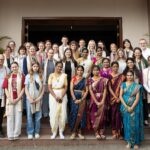6 questions about the pre-festivals to Eberhard Metternich
Eberhard Metternich is responsible for the pre-festivals at the international festival in Munich 2025, international choir meetings throughout Germany before the actual main festival in Munich. He brought this format to Germany in 2004 at the international festival in Cologne. As Cologne Cathedral Choirmaster, he also hosts two choirs from Spain and the Congo.
General information about the “pre-festivals”: What is the intention behind them?
The pre-festivals are a wonderful way to get in the mood for the big international PUERI-CANTORES festival in Munich. They enable the guest choirs to come into contact with German choirs and congregations before the main event, to exchange musical and spiritual ideas and to get to know a bit of the regional culture. It is about encounters, hospitality and a shared experience of faith across language barriers.
What prompted the organization of the “Pre-Festivals”? What opportunities do the meetings offer?
The experience of the last PUERI-CANTORES festival in Germany in 2004 has shown how valuable these decentralized encounters are. They not only give the international guests a better opportunity to acclimatize after a long journey, but also create lasting connections between choirs and people. Particularly in times of global challenges, personal exchange is a strong sign of the peace we want to promote.
How did the allocation of the international choirs to the German dioceses come about?
The allocation took place in close coordination between the international federation and the German national federation of PUERI CANTORES. Both existing contacts and logistical aspects were taken into account, such as travel routes and available local capacities. In some cases, it was also possible to realize desired partnerships.
You will be hosting two choirs in Cologne – from Spain and the Congo. Is there a background to these special connections?
Yes, we are very pleased to welcome two choirs to the pre-festival in Cologne: the Coro de la Catedral de Granada from Spain and the Chœur des Anges du Sacré-Cœur from the Congo. We have a warm friendship with Granada – our two choirs, the Girls’ Choir at Cologne Cathedral and the Boys’ Choir, were guests at the International Festival in Granada in 2012 and were welcomed there with great warmth. Now we have the pleasure of organizing the return visit. The choir from the Congo brings a completely different cultural timbre with it – and that is precisely what makes the encounter so exciting: different musical traditions meet, inspire each other and grow together into a common world of sound. Both encounters are based on great mutual openness and a shared faith.

Photo: Jennifer Rumbach
What is particularly noteworthy about the “Pre-Festival” in Cologne?
The focus is on personal encounters. In addition to joint rehearsals, concerts and church services, we celebrate a large sending-out ceremony in Cologne Cathedral with around 300 singers from Rome, Granada, the Congo and various choirs from the Archdiocese of Cologne – an impressive sign of lived diversity and unity in faith. Another highlight is the large barbecue at the cathedral church, where the families of the choir children are also actively involved. The accommodation of the guests in host families creates intensive personal contacts and makes a valuable contribution to international understanding. For many children and young people, this togetherness is sure to be an unforgettable experience.
Is there anything else you would like to mention explicitly?
I would like to encourage all choirs to get involved in hospitality – even if it involves a lot of effort. The experiences that arise are priceless. And last but not least, these encounters strengthen the faith of young people and allow them to experience diversity. At a time when many walls are being erected, our choirs are building bridges – with music, heart and openness.
Thank you very much for the interview!
Further information about the international Congress in Munich can be found here.





